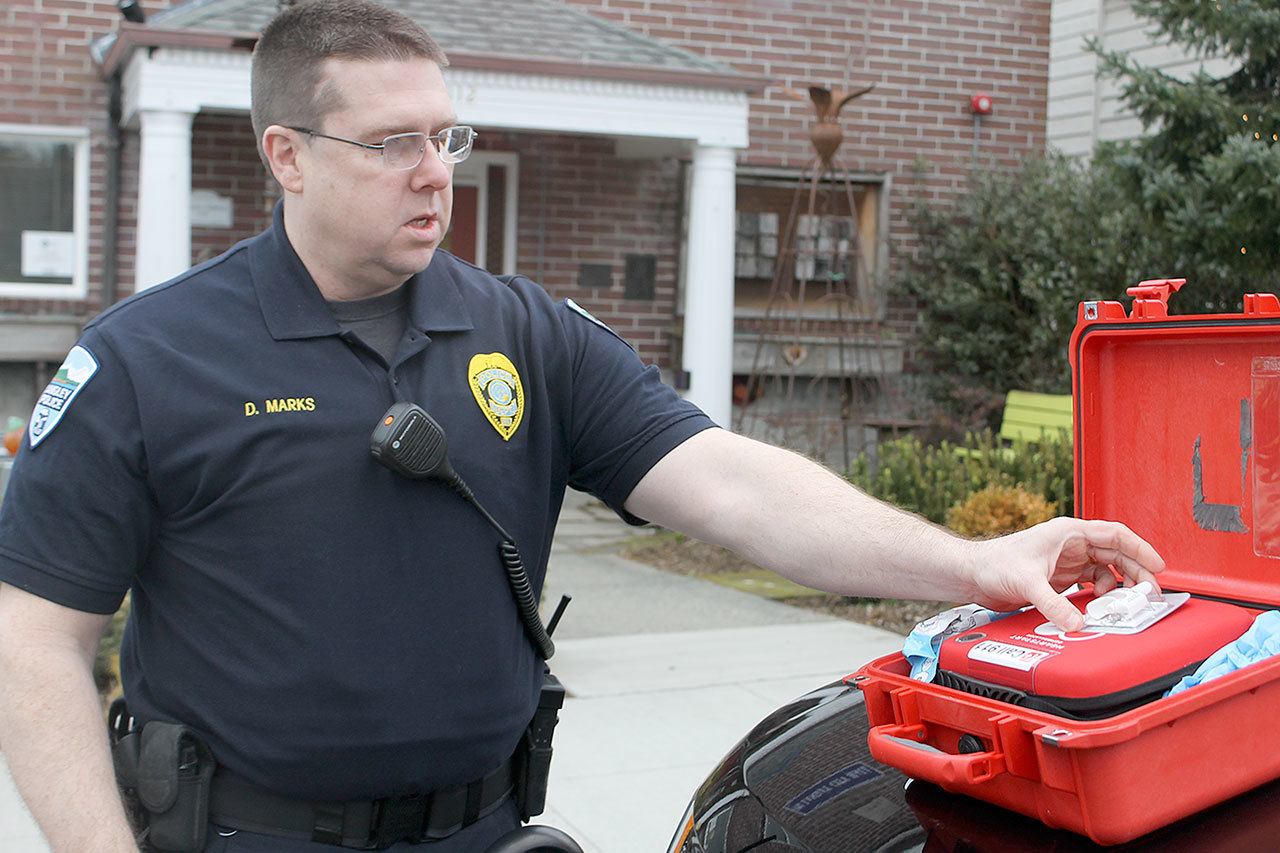Tucked away inside each of the defibrillator boxes carried by Langley Police Department’s four officers is a small nasal spray with the power to save a person from death’s grip.
Langley Police recently became the first law enforcement agency in Island County to carry Narcan, an opiate overdose antidote also known as Naloxone. While the department has not yet had to use the nasal spray, having equipped officers with Narcan just two weeks ago, Police Chief David Marks anticipates it will become a valuable asset for the community.
“I didn’t want to keep waiting and then have someone die because we’re not being proactive,” Marks said. “…We’re in a position where we can help people. There’s no reason not to step up to the plate and do it.”
The police department, along with WhidbeyHealth ambulances, are the only first responders on Whidbey Island equipped with the life-saving drug, which reverses the effects of an opioid overdose by blocking opiate receptors in the brain. Marks said police are often the first to arrive at medical calls and that responding with Narcan could help a person in immediate need.
“The purpose is to get the treatment to someone faster,” Marks said. “It’s going to save a little time from the time that we’re dispatched to the time we arrive to when the medics get there.”
The nasal spray can save both heroin addicts from an overdose as well as those who have taken too many prescription painkillers, Marks said. The symptoms in both scenarios are nearly identical. An overdose on opiates can suppress a person’s breathing and, if untreated, can lead to cardiac arrest.
“A lot of people are having surgeries and are being put on pain medicines after surgeries,” Marks said. “I could see it being used in that situation.”
Marks also is working on placing Narcan inside City Hall and equipping all of Langley’s public works staff, who are trained in CPR techniques, with Narcan.
Langley police officers are equipped with 4 milligrams of Narcan. A Naloxone kit costs $135 for two 4-milligram nasal sprays, which Marks believes is a reasonable price.
In 2016, WhidbeyHealth EMS utilized Narcan 34 times. In nearly every case, it was used to combat a narcotic overdose, according to Jeanne Sandahl, director of WhidbeyHealth’s Medical Center, and WhidbeyHealth Manager Roger Meyers.
WhidbeyHealth EMS has carried Narcan since the mid-1970s.
Narcan has also had a positive impact for the Seattle Police Department, which has saved the lives of 15 people who have overdosed since March, 2016, according to Police Safety Officer Steven Redmond. Snohomish County Sheriffs are also carrying the nasal spray, Marks said.
Heroin usage has been a topic of conversation on South Whidbey and coverage in The Record this past year, from a petition by a Clinton man to equip first responders in Island County to a slew of heroin syringes found by Langley police in August, 2016. Marks sees the heroin problem on Island County as having gotten “continually worse over the past seven years.”
“From what I’m seeing, meth has tapered off a little bit,” Marks said. “Heroin has taken its place. That was my concern.”
Police Officer Mason Shoudy believes there is no downside to carrying Narcan.
“I think it’s a fantastic thing that Dave has really pushed for,” Shoudy said. “I think it’s going to have a really positive effect in a small community where a lot of drug-related activity happens.”
Marks believes there will be other law enforcement agencies watching Langley’s police department to see “how it goes.”
The Island County Sheriff’s Office is aware of Langley police becoming equipped with Narcan, according to Sheriff Mark Brown. Brown said his staff do not carry it, but that they are trained in CPR techniques that can help treat a person until medical personnel arrive to administer the nasal spray.
“Certainly, Narcan is a component,” Brown said. “It’s another tool in our tool kit. But, it is not to be confused with the only tool. The most important thing you can do with someone who is not breathing is to breathe for them.”
He believes it is most critical for family members of those who may suffer from an overdose and medical personnel to be trained in how to use Narcan. Brown also said that he is not opposed to funding the purchasing of the nasal spray, but that is most critical for family members of those who may suffer from an overdose and medical personnel to be trained in how to use Narcan. He also said he would consider equipping his staff with Narcan if there is an increase in the number of times the department responds to overdoses.
While the Sheriff’s Office does not carry Narcan, Brown said Island County Jail is also in the process of acquiring Naloxone kits for usage.



